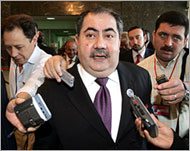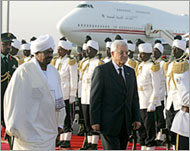Arab summit ends on note of apathy
The 18th Arab summit has ended with the usual pled

Addressing the final session of the two-day Arab League summit in Khartoum on Wednesday, Ghazi al-Gusaibi, the Saudi labour minister, said the next meeting should instead be held in Egypt although he gave no reason for his country’s refusal to act as host.
The Saudi move is being seen by some as indicative of a growing impatience with the Arab League’s lack of executive power.
The annual meetings of the 22-member league regularly focus on challenging regional issues, but are often criticised for concluding with resolutions that are long on rhetoric and short on concrete action.
This year key states Saudi Arabia and Egypt were among 10 countries not to send heads of state to the meeting.
Announcing the Saudi decision, al-Gusaibi cited an Arab League resolution stipulating that Egypt, home to the league’s headquarters, should host the 2007 summit if the chair country did not want to.
Amr Moussa, the Arab League secretary-general whose term was extended for five years at the summit, sought to play down the Saudi decision, saying Saudi Arabia and Egypt had jointly agreed to have the next summit in Cairo.
He said he saw no problem “as long as everyone was satisfied” with the decision.
Solidarity
Concluding the summit with their usual pledges of solidarity with Palestinians and Iraqis, Arab leaders also renewed their commitment to a 2002 Arab peace initiative, which offered Israel a comprehensive peace in return for a withdrawal from Arab lands.
Israel has rejected that initiative.
 |
|
Zebari asked Arab states to give |
In the closing summit statement, members also called on donor countries to respect the electoral choice of the Palestinians, who gave the Islamist Hamas group a sweeping victory in January, and fulfil commitments to give them aid.
Earlier, during the summit’s closing session, the Iraqi foreign minister harangued fellow Arab governments
|
|
, demanding firm commitments to his country, wracked by anti-government violence and a growing sectarian rift.
“It is our right to tell our brothers, after decades of the authoritarian rule and wars, that we expect them to support our political march and extend any help and backing that will contribute to isolating terrorism and drying up of the sources that finance its activities,” Hoshyar Zebari said.
Arab leaders, he said, should upgrade their diplomatic representation to the ambassadorial level and forgive Iraq‘s debts.
The summit resolution said Arab leaders agreed to send diplomats to Baghdad, though it did not give a timeframe. Arab nations have been hesitant to send high-level diplomats to Baghdad since the kidnapping and murder of Algerian and Egyptian diplomats there last year.
Sudan backed
Meanwhile, in a coup for the Sudanese president, Omar al-Bashir, the leaders pledged financial backing for the African Union peacekeeping mission in Sudan‘s Darfur region and rejected the imposition of a UN-led force without Khartoum‘s permission.
 |
|
The summit failed to pledge |
Al-Bashir has resisted Western pressure to let the UN take over from the 7000 AU troops there, saying that would violate Sudan’s sovereignty.
The leaders also addressed the caricatures of Islam’s Prophet Muhammad that were published in European newspapers, causing widespread outrage among Muslims and some violent protests.
The declaration urged the need for “co-operation, dialogue and mutual respect between peoples and cultures … and remind that respecting religious sanctities and beliefs is the decisive factor in building confidence and bridges of friendship between nations”.